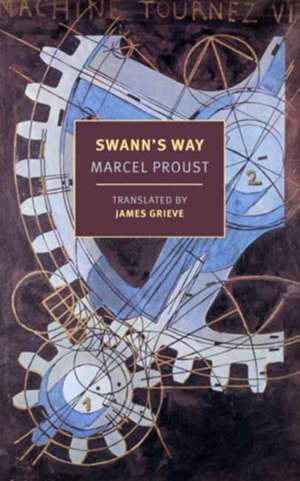Swann's Way
Autor James Grieve, Marcel Prousten Limba Engleză Paperback – 23 mai 2023
Swann’s Way, the first of the seven volumes that constitute Marcel Proust’s lifework, In Search of Lost Time, introduces the larger themes of the whole work while standing on its own as a brilliant evocation of childhood, hopeless love, and the French Belle Époque.
We first encounter Proust’s narrator in middle age, consumed with regret for his misspent life. Suddenly, he is back in the past, seized by memories of childhood: his clinging attachment to his mother, his dread of his father, summers in the country and the two walks his family was in the habit of taking—one by an aristocratic estate, the other by the house of a certain Charles Swann, to whom a mystery was attached. A child’s world, and the world of adults the child struggles to imagine, spread out before us, while Proust’s pages teem with incident and puzzlement, pathos and humor.
The novel then takes a further step backwards to tell the story of Swann’s infatuation with the courtesan Odette. Swann, man-about-town and familiar of royalty, is reduced to walking after midnight, forlorn as a child awaiting a goodnight kiss.
James Grieve began his career translating Proust in the early 1970s, driven by his dismay at how many readers recoiled from what they imagined to be the difficulty of Proust’s work, and his translation of Swann’s Way brings out the book’s fluency and speed as no other version does. It offers an unequaled introduction to an incomparably absorbing work of art.
Preț: 92.43 lei
Preț vechi: 109.03 lei
-15% Nou
Puncte Express: 139
Preț estimativ în valută:
17.69€ • 18.52$ • 14.63£
17.69€ • 18.52$ • 14.63£
Carte disponibilă
Livrare economică 15-22 martie
Livrare express 04-08 martie pentru 45.83 lei
Preluare comenzi: 021 569.72.76
Specificații
ISBN-13: 9781681376295
ISBN-10: 1681376296
Pagini: 384
Dimensiuni: 132 x 204 x 32 mm
Greutate: 0.47 kg
Editura: The New York Review of Books, Inc
ISBN-10: 1681376296
Pagini: 384
Dimensiuni: 132 x 204 x 32 mm
Greutate: 0.47 kg
Editura: The New York Review of Books, Inc
Notă biografică
Marcel Proust (1871–1922) was a French novelist, critic, and essayist. Born in Auteuil, Paris, Proust began his literary career writing criticism and short stories for Le Banquet, La Revue Blanche, and Le Figaro. At 38 years old, Proust began gathering material for what would become his monumental epic, In Search of Lost time, which he would work on for the rest of his life. Published in seven volumes between 1913 and 1927, the second volume won the Prix Goncourt, France's most prestigious literary prize. The monumental epic tracks economic and cultural change taking place in France at the end of the Third Republic; its play with the themes of memory and time earned him a reputation as one of the most influential writers of the twentieth century.
James Grieve (1934–2020) was an Australian translator and author. Best known for his translations of Proust, Grieve also translated two children's books, wrote book reviews for The Canberra Times, and taught French language and literature at the Australian National University in Canberra.
James Grieve (1934–2020) was an Australian translator and author. Best known for his translations of Proust, Grieve also translated two children's books, wrote book reviews for The Canberra Times, and taught French language and literature at the Australian National University in Canberra.
